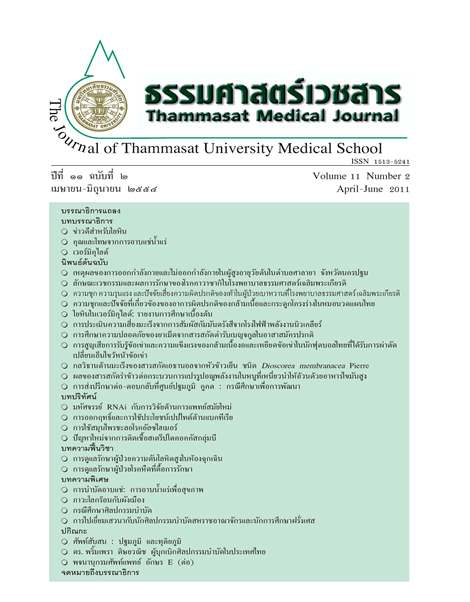Study on safety of Benjakul recipies extract tablets in normal volunteers.
Keywords:
เบญจกูล, การวิจัยคลินิกสมุนไพร, Benjakul, Herbal clinical trialAbstract
Benjakul, a Thai Traditional medicine recipe, is composed of five herbs: Piper chaba fruit, Piper sarmentosum root, Peper interruptum stem, Plumbago indica root and Zingiber officinale rhizome. It is a balance body recipe in theory of Thai Traditional Medicine. From selective interviews of folk doctors in Southern Thailand, it was found that Benjakul was used as the adatogen drug for cancer patients. This research design was a clinical trial open label study, which was approved by ethical review committee Faculty of Medicine, Thammasat University.
The main objectives of research were to study on safety of Benjakul recipies extract tablets in 20 normal volunteers. The volunteers were divided into 2 groups, 10 samples for each, which received 100 milligram orally and 200 milligram orally, respectively. Tablet was taken 3 times a day after meal for 14 days continually. The safety of Benjakul recipies extract tablets were determined by physical examination and laboratory tests for liver function test (LFT), renal function test (RFT), lipid profile, blood sugar,hematology and malondialdehyde, before and after administering Benjakul recipies extract tablets in day 0, day 1, day 7, day 14 and after finishing drugs 2 weeks (D1m). Twenty-three subjects took Benjakul recipies extract tablets with conventional medicine. The results found that both groups of volunteers had no severe adverse event (SAE). However, some volunteers had irrigable bowl syndrome but the symptoms were not dose response. The levels of laboratory tests were changed within normal values. Even though blood chemistry evaluation showed that total protein levels after taking extract were significantly lower than that of the same group before taking extract, they still were within normal values. Tthere was significant decrease (p < 0.05) serum ALT and ALP levels in group 1.
In conclusion, the tablets of Benjakul recipies extract 100 milligram or 200 milligram 3 times a day for 14 days continually did not cause significant change of clinical signs. Laboratory testing results were still within normal values.
Key words: Benjakul, Herbal clinical trial



